Is Your Refrigerator Freezing Food? Here's Why & the Fix
Author: Anne Cowart | Editor: Omar Alonso
Review & Research: Jen Worst & Chris Miller
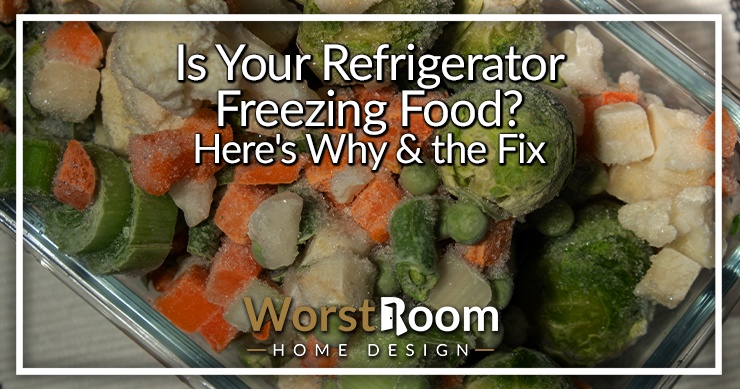
Are you tired of discovering frozen lettuce, icy milk, or rock-hard eggs in your refrigerator? If so, you're not alone. Many people deal with the frustrating problem of their refrigerator freezing food when it's supposed to keep it fresh and crisp.
While some prefer to troubleshoot their refrigerator, others choose to donate them. This offers a convenient way to ensure unwanted appliances find new homes where they can still be of use. Whether due to upgrading to a newer model or wanting to downsize, donating through Easy Donation Pickup makes a positive impact without the hassle of disposal.
But of course, buying a new refrigerator isn’t always the solution. Your appliance might be barely new, and it just needs a minor repair, like thermostat adjustments. You can save money by knowing some of the most effective ways to handle freezing food from your refrigerator and other related issues.
In this article, we'll explore the common causes behind this chilling dilemma and provide practical solutions for fixing it.
By understanding how refrigerators work and taking simple preventative measures, you can ensure your fridge remains cool without turning your groceries into ice blocks.
Common Causes of a Refrigerator Freezing Food
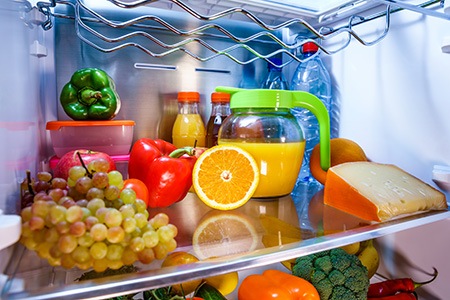
Refrigerators are supposed to keep our food fresh, but when they start turning our groceries into icy treats, it can be perplexing.
Understanding the common causes behind this issue is the first step towards resolving it effectively.
Let's explore some of the common causes behind refrigerator freezing.
Faulty Temperature Sensor
Refrigerators have temperature sensors that monitor and regulate the internal temperature. If the sensor becomes faulty or develops inaccuracies, it can misread the temperature and cause the fridge to become too cold.
Electronic Control Issues
The electronic control board or thermostat in a fridge regulates the temperature. If damaged, it can cause freezing by mismanaging its temperature settings or defrost cycles.
For example, foods with high moisture content placed close to a poorly managed cooling mechanism may freeze unexpectedly. When my electronics panel is having issues, my fridge will make clicking noises, letting me know I need to power cycle it.
Dirty Condenser Coils
The condenser coils release heat from the refrigerator's refrigerant, allowing it to cool down and maintain the desired temperature.
However, when the condenser coils become coated with dust and grime, it hampers their ability to dissipate heat efficiently. As a result, the refrigerator may run longer and colder than necessary, causing food items to freeze.
Faulty Defrost System
Refrigerators today have a defrost system that periodically melts accumulated ice on the evaporator coils.
However, if the defrost system malfunctions, it can cause an excessive ice build-up on the coils. This can disrupt the cooling process and result in uneven temperatures, including food freezing or complete defrosting and a smelly fridge even after cleaning.
Signs of a Refrigerator Freezing Issue
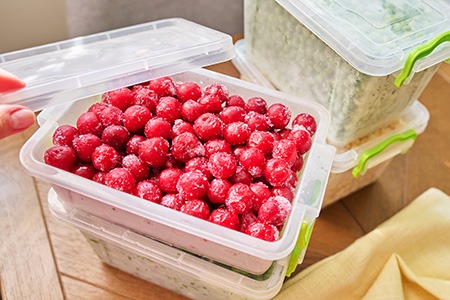
Identifying signs of a freezing issue in your refrigerator is crucial for maintaining the quality and safety of your stored food items.
Here are a few signs to watch out for to determine if your refrigerator freezing food is in your future:
Frost Build-Up
Excessive frost or ice accumulation on the walls, shelves, or food packaging indicates freezing issues. The presence of frost suggests that moisture in the air is condensing and freezing, leading to a colder environment than desired.
Texture & Appearance Changes
Frozen food can undergo noticeable changes in texture and appearance. Fruits and vegetables may become mushy or develop a spongy texture, while meats can exhibit freezer burn, characterized by dry, discolored patches.
Difficulty Opening Drawers or Doors
If the drawers or doors of your fridge become difficult to open or close, it could be a sign of excessive coldness making the components freeze and stick together.
Uneven Cooling
Uneven cooling throughout various compartments of your refrigerator can also signal a freezing problem. For instance, while some areas might be too cold, other sections may not feel as cool—a possible indication of airflow obstruction in the fridge. You may notice it's taking your refrigerator too long to get cold, too.
Water Droplets
Droplets forming around the door seal suggest that warmer air enters from outside due to a faulty gasket or damaged seal.
Excessive Energy Consumption
Freezing issues can cause your refrigerator to work harder to maintain the low temperature, leading to increased energy consumption. If you notice a significant rise in your energy bills without any other explanation, it could be attributed to freezing issues in your fridge.
How to Fix Refrigerator Freezing Issues
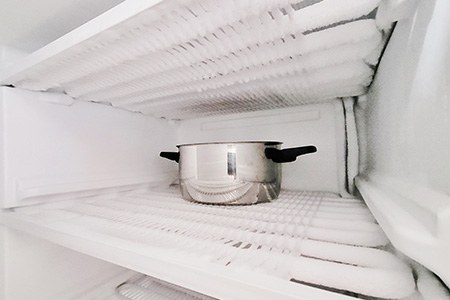
Why is my fridge freezing everything? Learn how to fix your refrigerator freezing food and reclaim control over the perfect temperature for your groceries with these helpful tips and solutions.
Adjust Temperature Settings
Carefully adjusting temperature settings helps maintain an optimal food preservation environment and prevents unintentional freezing.
The ideal refrigerator temperature setting ranges from 37 °F (3 °C) to 40 °F (4 °C), while the freezer should be set between 0 °F (-18 °C) and 5 °F (-15 °C).
To start tweaking your refrigerator's temperature, begin with small changes before gradually increasing or decreasing the settings as needed.
For instance, if you notice vegetables turning icy after a few days, slightly reduce the coldness level in your fridge compartment and observe any improvements over time.
Be patient: it might take several trials to pinpoint the perfect balance.
Fix Airflow or Seal Issues
If your fridge has blocked vents or faulty seals, the air can't circulate properly, causing uneven cooling and leading to frozen food.
To fix this issue, you will need to inspect the vents and seals for any obstructions or damage.
It's also essential to check that the freezer compartment isn't overfilled, as crowded spaces can restrict air movement leading to uneven cooling. Ensure that items in the refrigerator are not blocking any vents around them.
Lastly, be mindful when closing doors; slamming them can cause damage to door seals which will eventually lead up to problems such as food freezing over time.
Organize Food Properly
One way to prevent food from freezing in your refrigerator is by organizing it properly. Start by checking the temperature settings and ensure that they're not too low. Also, avoid overfilling the fridge with items that restrict proper airflow.
It's also crucial to check door seals regularly, as they help maintain proper temperatures inside the fridge while preventing cool air from escaping. If you notice any gaps or cracks, have them replaced immediately.
Replace Faulty Parts
If you've tried adjusting the temperature settings and fixing any airflow issues in your fridge, but it's still freezing your food, you may need to replace faulty parts.
Faulty parts, such as a malfunctioning temperature sensor or a broken fan motor, can cause overcooling and prevent proper cooling efficiency.
A noisy or non-spinning evaporator fan is another common culprit for refrigeration problems that require part replacement. Make sure you're using the correct gauge extension cord for your fridge, too, if you are using one.
By replacing faulty parts with new ones, you'll ensure the optimal functioning of your refrigerator for years to come. If you're unsure which part needs replacing, consult a professional technician who can diagnose the issue and recommend appropriate solutions.
Preventative Measures to Avoid Food Freezing
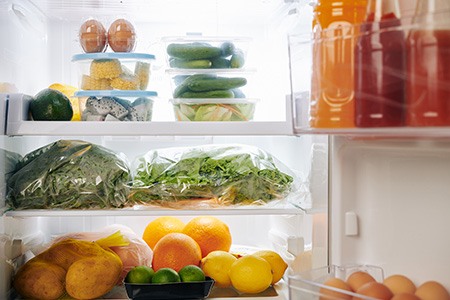
How do I stop my fridge from freezing? Stay one step ahead of your refrigerator freezing food with these proactive preventative measures to help you avoid the frustration of freezing food in your refrigerator.
Maintain Optimal Temperature
Maintain the optimal temperature in your refrigerator to ensure your food is fresh and safe. The recommended temperature for a conventional fridge is between 38 °F - 40 °F, while the freezer should be kept at 0 °F or cooler to prevent freezing.
Keeping your fridge at this temperature helps inhibit bacterial growth, which can cause spoilage and potentially lead to foodborne illness.
To maintain the proper temperature in your refrigerator, it's vital to check and adjust the settings periodically. You should also invest in a thermometer or temperature monitoring system for assurance.
Store Food Correctly
Storing food correctly is crucial to preventing bacterial growth and avoiding illnesses. Proper storage starts with understanding the optimal temperature for different types of food.
For example, dairy products should be stored at or below 40°F while meats should be kept at a temperature of 32 °F to 40 °F.
When storing leftovers in the refrigerator, ensure they're in an airtight container within two hours after cooking and consumed within four days.
In addition, organizing your fridge properly can help maintain airflow and prevent freezing issues. Keep foods away from vents or fans that circulate cold air around the refrigerator, as they may freeze unexpectedly.
Avoid Overcrowding
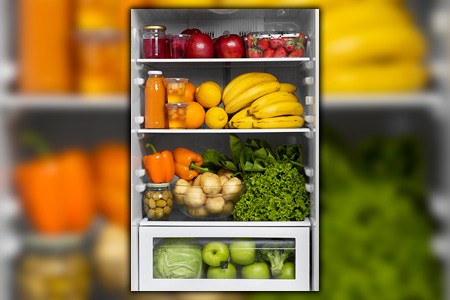
Keeping your fridge organized is crucial in preventing food from freezing. Overcrowding the shelves or drawers hinders proper airflow, leading to cold spots and uneven temperature distribution.
When air can't circulate properly, moisture builds up more quickly, causing frost accumulation and potential malfunctions. Leave enough space for the cold air to flow freely by decluttering your fridge regularly.
Moreover, avoid storing warm or hot foods in the refrigerator as they raise the internal temperature and cause other perishables to freeze. Instead, let them cool off at room temperature before transferring them into the fridge.
Remember that leaving too much food inside may lead to frozen items and shorten their shelf life due to bacterial growth caused by insufficient cooling temperatures.
Regularly Clean & Maintain
Keeping your refrigerator clean and well-maintained is essential to stop food from freezing. Regular cleaning can help maintain optimal temperature levels and prevent the growth of bacteria like Listeria.
Make sure to wipe spills immediately to prevent drips from thawing and causing further issues. Regularly checking and replacing faulty parts, such as door seals or temperature sensors, will ensure your fridge works properly.
Regular Defrosting
If your refrigerator has a freezer compartment, regularly defrost it to prevent excessive ice build-up.
A thick layer of ice can obstruct airflow and lead to freezing issues in the refrigerator section. Follow the manufacturer's instructions for safe and effective defrosting.
Avoid Placing Hot Items in the Refrigerator
Before placing hot leftovers or cooked dishes in the refrigerator, allow them to cool to room temperature.
Hot items raise the temperature inside the fridge, leading to increased cooling and potentially freezing other foods.
That’s Why Your Refrigerator is Freezing Food
Why is my fridge suddenly freezing everything? You can fix the issue by adjusting temperature settings, fixing airflow or seal issues, organizing food properly, and replacing faulty parts.
A refrigerator freezing food can be frustrating and costly. However, it’s a problem that can be solved easily with a proper understanding of the causes and preventative measures.
When To Call an Expert
If you're experiencing any of persistent issues with your refrigerator, it's best to contact a qualified repair technician rather than attempting to fix the problem yourself. They have the expertise and tools to diagnose and repair the issue safely and effectively.
If your food is consistently freezing even when you adjust the temperature settings, there may be an issue with the thermostat or temperature control mechanism. If you notice a significant ice buildup, it could indicate a problem that needs professional attention.
If the temperature in your refrigerator fluctuates frequently, it can lead to freezing food. A technician can diagnose the underlying cause of these fluctuations and repair any issues. Also, unusual noises or odors could indicate a mechanical problem that needs to be addressed by a professional.




